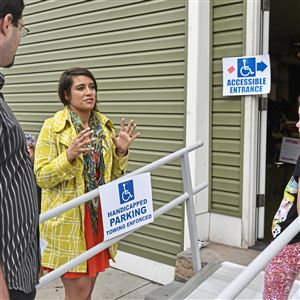HARRISBURG — Philadelphia Democrat Mike Stack on Tuesday became the first lieutenant governor in modern Pennsylvania history to lose a re-election in a primary.
Mr. Stack was dealt a crushing defeat in Tuesday’s election, falling to Braddock Mayor John Fetterman in one of the most hotly contested primaries for lieutenant governor. Four Democrats — Fetterman, Nina Ahmad, a onetime deputy mayor to Philadelphia Mayor Jim Kenney, Chester County Commissioner Kathi Cozzone and Montgomery County banker and insurance agent Ray Sosa — had vied to knock Mr. Stack out of the job.
Unofficial vote counts showed Mr. Fetterman drawing nearly 40 percent of the vote, with Mr. Stack getting half as much. With 100 percent of the vote counted, Mr. Fetterman had 287,988 votes; Ms. Ahmad had 182,108; Ms. Cozzone had 142,113, Mr. Stack had 127,187, and Mr. Sosa had 27,414.
Mr. Fetterman entered the theater in Braddock where supporters watched poll results at 10:20 p.m. to raucous applause.
“Wow,” Mr. Fetterman told the crowd during his election party victory speech Tuesday night, where he was greeted with thunderous applause, adding: “I want to take our message of 'all places matter'” to the general election.
Mr. Fetterman bills himself as a progressive, which he has said means he will champion “evidence-based public policies that benefit the most people possible.” He was endorsed by U.S. Sen. Bernie Sanders and various progressive groups.
With the loss, Mr. Stack, who hails from an entrenched political family in Philadelphia, will make the history books: A sitting lieutenant governor has not lost a primary election since state law changed nearly a half-century ago to permit the holder of the office to serve two terms.
Mr. Fetterman will now run alongside Gov. Tom Wolf as a ticket in the fall election, though Mr. Wolf, in an eyebrow-raising move, remained neutral in the primary.
A spokesman for Mr. Stack could not immediately be reached for comment.
On the Republican side of the ledger, Lower Merion real-estate executive Jeff Bartos won 47 percent of the vote over his three primary contenders.
For both major parties, the primary was crowded with challengers seeking to become the state’s second-in-command, which political insiders often jest is the best job in the Capitol. The position comes with a $163,672 annual salary and a 2,400-square-foot mansion funded by taxpayers, yet it involves only a fraction of the work and stress that comes with the governor’s office.
On the Democratic side, aside from Ms. Ahmad and Mr. Fetterman, Mr. Stack, a onetime state senator, faced challenges from Chester County Commissioner Kathi Cozzone and Montgomery County banker and insurance agent Ray Sosa.
On the Republican side, Mr. Bartos topped Diana Irey Vaughan, a longtime Washington County commissioner; Kathy Coder, a Republican State Committee member from Allegheny County; and Marguerite “Peg” Luksik, from Cambria County. In doing so, he will join the GOP ticket with state Sen. Scott Wagner, who won Tuesday’s GOP nomination for governor.
In running for a second term, Mr. Stack had fought against the lingering stain of allegations that surfaced last year that he and his wife Tonya had verbally abused staffers who worked at the taxpayer-funded residence, as well as the State Police detail assigned to protect them.
In an unusual step, Mr. Wolf had ordered Inspector General Bruce Beemer’s office to launch an investigation into the matter, and deliver a report on its findings. Amid the inquiry, Mr. Wolf took the unprecedented step of yanking Mr. Stack’s State Police protection and sharply scaled back staff at the lieutenant governor’s residence. Soon after, Tonya Stack began seeking in-patient treatment for a mental health issue, Stack’s office confirmed.
In the end, the governor decided to shield the Inspector General’s report from the public.
In campaigning for reelection, Mr. Stack avoided discussing the controversy surrounding his treatment of employees. Instead he touted his experience as an elected official, including his nearly four years as lieutenant governor and another 13 years as a state senator representing Northeast Philadelphia.
Mr. Stack had also attempted to showcase his office’s launch of the Pathway to Pardons program, which aims to help former offenders learn how to clear their criminal records and ease their path to employment; as well as his work to streamline the often long and complicated process of obtaining a pardon.
But nearly all of Mr. Stack’s opponents had run on a platform of making the office relevant again. The duties of the lieutenant governor include presiding over the state Senate (and casting the tie-breaking vote, if necessary) and chairing the Board of Pardons. The lieutenant governor also would take over running the state if the governor were to die in office, or as it happened in the case of former Republican Gov. Tom Ridge, leave for another position.
Mr. Stack’s opponents had said they wanted to expand on those duties, and work closely with the governor’s office to champion issues important to the administration.
Mr. Stack and Mr. Wolf’s icy relationship was one of the worst-kept secrets in the Capitol. The two rarely appeared at events together and never jointly pushed policy issues. During the primary, Mr. Wolf stayed neutral.
Despite reports of their estrangement, Mr. Stack’s campaign had said the lieutenant governor supported Mr. Wolf’s policies and reelection.
The two men will run as a ticket in the fall, although few expect they will campaign for reelection together, as many governor-lieutenant governor duos have in past years.
But a group of Republican state senators is seeking to change the way lieutenant governors run in primaries. They are pushing a measure that would allow gubernatorial candidates to choose their running mates. As it stands now, governors and lieutenant governors run separately in primary elections and only become a ticket in the general election.
The bill was spurred, in part, but the estranged relationship between Mr. Wolf and Mr. Stack.
Staff reporter Andrew Goldstein contributed.
Correction, posted May 16, 2018: In an earlier version of this story, Nina Ahmad’s name had the wrong courtesy title.
First Published: May 16, 2018, 2:32 a.m.






















